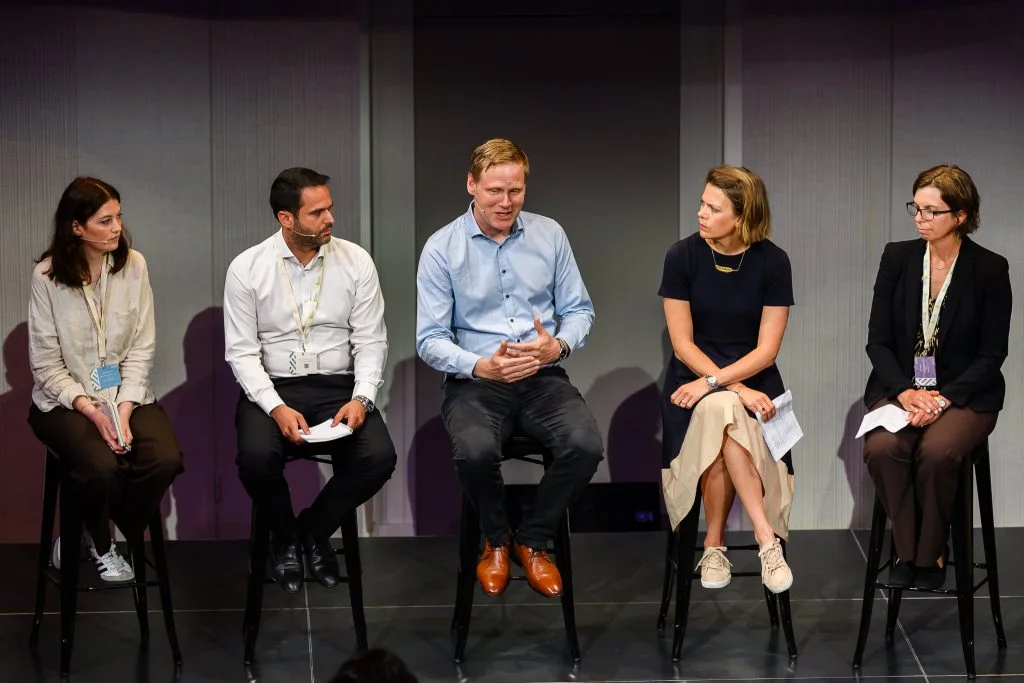
One of the four key themes of the Better Cotton Conference 2023 was Data and Traceability – reflecting a key priority for the organisation ahead of the launch of our traceability solution at the end of 2023. With the goal of tracing cotton grown in over 36 countries and sold in over 50, representing 20% of global cotton, the conference provided a great opportunity to bring together sector experts to discuss the complexities of such a significant project.
In order to understand how to successfully roll out traceability, we have run several pilots across a range of countries, so during the conference we brought together representatives from some of the organisations who have been central to these pilots to explore key learnings and challenges. Jacky Broomhead, Senior Traceability Programme Manager at Better Cotton, was joined by Erin Klett from Verité, Mahmut Pekin from the Louis Dreyfus Company, Anna Rönngard from Textile Genesis, Martha Willis from C&A, Abdala Bernardo from SAN-JFS, and Alexander Ellebrecht from Chainpoint.
After the panel, we sat down with Alexander Ellebrecht, Manager, Business Development at Chainpoint, a software provider with extensive experience in value chains for non-profits that has supported Better Cotton in two of these traceability pilots, to hear about his key takeaways from the session.
Why is traceability a growing priority for the cotton sector?
A range of different perspectives were represented in our panel, from brands and software providers such as us to ginners and traders. From each perspective, the pilots – and traceability in general – offer somewhat different advantages. Traceability provides supply chain actors with better data on their sourcing relationships, allowing them to work on continuously improving. This is a two-way street – based on hard data about performance upstream, better feedback and training can be provided, in service of their progress.
How can organisations incentivise their supply chains to take up traceability?
A topic that was mentioned multiple times is communication. Supply chains are complex and, by definition, made up of different actors with different incentives, often in different countries. One of the panellists explained how, during their trial project in India, they held calls with stakeholders from different tiers in the supply chain, to explain the purpose and importance of piloting, highlighting upcoming legislation as important context.
Communication over multiple tiers is quite rare in most supply chains, but this was successful because it was held from an incentive perspective, rather than a sustainability perspective. Not explaining traceability as something we must do because we want to be more sustainable, but rather as an opportunity that offers benefits to all involved.
This is a perspective that we embrace at Chainpoint – one of our key priorities is creating a business case for every actor, throughout the supply chain. That revolves primarily around earning money, rather than increasing sustainability or improving working conditions. Changing the world for the better is often achieved best when pairing idealism with pragmatism, knowing that mere idealism is a meagre basis for durable change in behavioural patterns. This highlights the importance of the collaborative model that Better Cotton embraces.


What other lessons were learned during the pilots?
Besides offering incentives to all involved and ample communication, local and changing circumstances need to be taken into account. That is one of the reasons for the existence of no fewer than four pilots in different countries, for two of which ChainPoint was the digital platform partner. There is no silver bullet regarding traceability and local circumstances will define your solution to a large extent. A high degree of flexibility is required from both the organisations involved and the software they use. There is – and will always be – a gap between theory and practice. It is only by keeping your ears open and making adaptions where necessary that you will be able to bridge that gap.
How important is the role of technology in traceability?
The key challenge with technology is often not related to delivery – about which the panel’s feedback was positive across all the pilots – but rather how we use it. Being able to use the platforms intuitively and have them work alongside existing data systems and processes is key to the technology’s success – we need technology to be as frictionless as possible. Any system or software ideally reduces the administrative burden on those using it, rather than the opposite. Ultimately, the goal should be to overcome the challenges we’ve discussed and create a universally applicable framework for data collection and reporting.
A final key learning is that many supply chain actors, especially suppliers, are quite tech-savvy. It is important to realise that while there are significant challenges in the adoption of any new technology or data collection process, we shouldn’t underestimate people with a clear and common goal and the right incentives to get there.







































